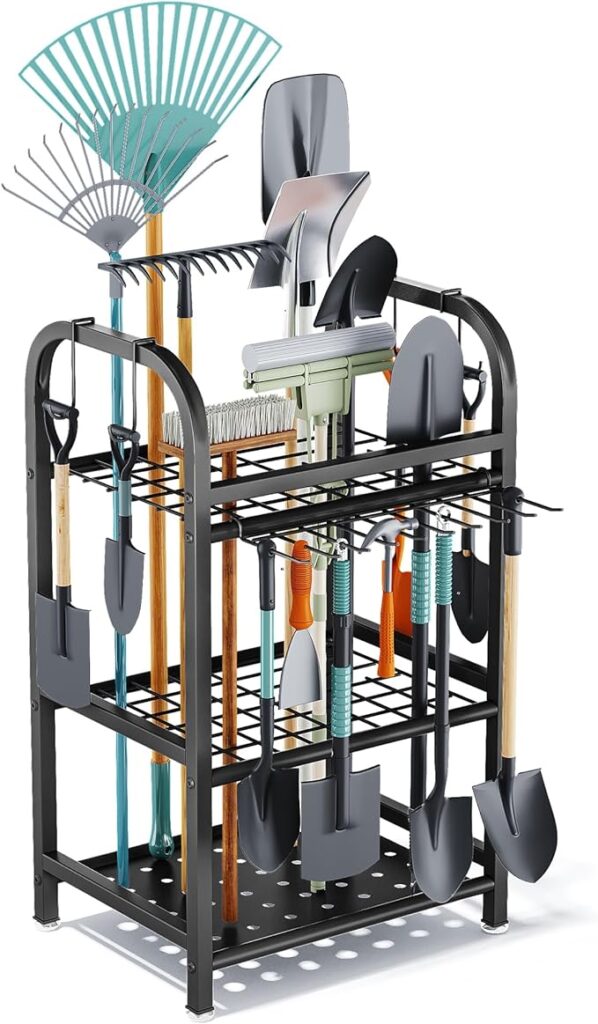Nature (la natura) is what brings us peace and calm. In this a1 Italian vocabulary lesson, you will learn new words about nature so you can talk about it with your Italian friend very simply.
How do you say nature in Italy?
Nature in Italy is (la natura) a feminine singular noun and the plural is (le nature).
What is “beautiful nature” in Italian?
The word (beautiful) in Italian is the masculine adjective “bello” plural “belli“, the feminine is ” bella” and the plural is “belle“. (nature) as we just mentioned is “natura” so (beautiful nature) in Italian is “bella natura” .The word “natura” takes the feminine form of the adjective “bello” because (nature) is a feminine noun and in Italian the adjective follows the noun in gender and number.
What is “beauty of nature” in Italian?
The word (beauty) in Italian is “la bellezza“, (of) in Italian is “di“, and (nature) in Italian is “la natura“, so beauty of nature in Italian is ” la bellezza della natura“
What Italian word for nature lover?
The word lover in Italian is “amante” and nature is “natura” so the Italian word for nature lover is “amante della natura“.
A1 Italian vocabulary: What are the Italian nature terms?

- La Natura (The Nature)
- La Terra (The Earth / The Land)
- L’Albero (The Tree)
- L’Aria (The Air)
- Il Fiore (The Flower)
- La Pianta (The Plant)
- L’Uccello (The Bird)
- Il Mare (The Sea)
- Il Fiume (The River)
- Il Lago (The Lake)
- La Montagna (The Mountain)
- La Campagna (The Countryside)
- Il Cielo (The Sky)
- Il Prato (The Lawn)
- Il Sole (The Sun)
- La Stella (The Star)
- Il Bosco(The Woods)/La Foresta(The Forest)/La Giungla(The Jungle)
- La Collina (The Hill)
- L’Isola (The Island)
- Il Deserto (The Desert)
Amazon Ads
1. la natura | the nature
Noun feminine singular (La natura) plural (Le nature)
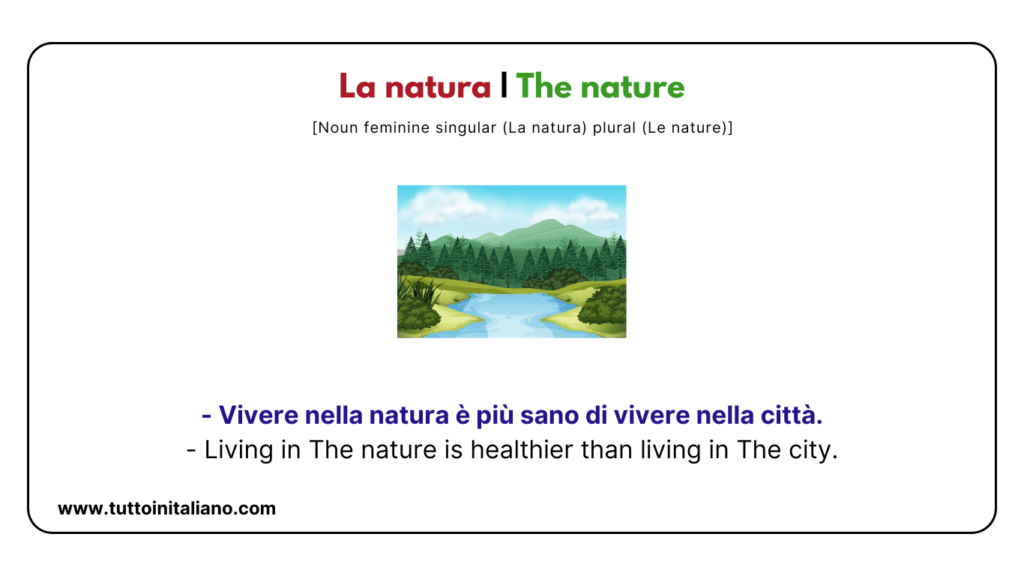
- Le persone di questo villaggio vivono in armonia con la natura.
- The people of this village live in harmony with nature.
- Vivere nella natura è più sano di vivere nella città.
- Living in nature is healthier than living in the city.
- Gli esseri umani distruggono la natura ogni giorno con la tecnologia.
- Humans destroy nature every day with technology.
2. la terra | the earth / the land
Noun feminine singular (La terra) plural (Le terre)
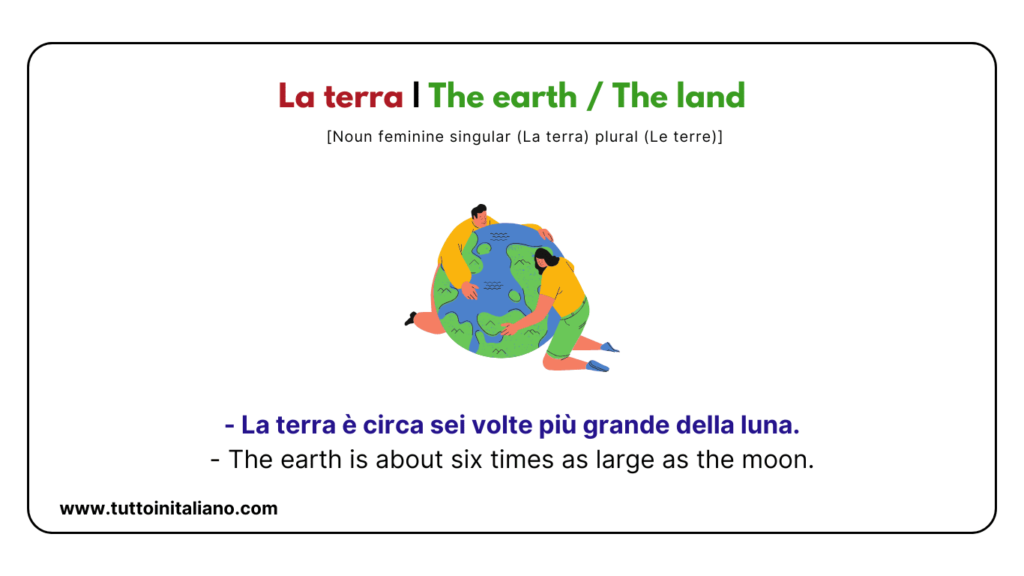
- La terra è circa sei volte più grande della luna.
- The earth is about six times as large as the moon.
- Il bicchiere cadde a terra.
- The glass fell to the ground.
- Lascia la scatola per terra!
- Leave the box on the floor!
- Gli esseri umani, gli uccelli, le piante e gli animali vivono insieme sulla terra
- Humans, birds, plants, and animals live together on earth
3. l’Albero | the tree
Noun masculine singular (l’albero) plural (Gli alberi)

- Gli uccelli costruiscono i loro nidi sugli alberi.
- Birds build their nests in trees.
- Si ricava il legno dagli alberi.
- Wood is obtained from trees.
- Un albero di mele.
- An apple tree.
4. l’Aria | the air
Noun feminine singular (L’aria) plural (Le arie)

- L’aria è essenziale per la vita della maggior parte degli animali e vegetali, e anche per la vita umana.
- Air is essential for the life of most animals and plants, and also for human life.
- Voglio fare una passeggiata all’aria aperta.
- I want to take a walk in the fresh air.
5. il fiore | the flower
Noun masculine singular (Il fiore) plural (I fiori)
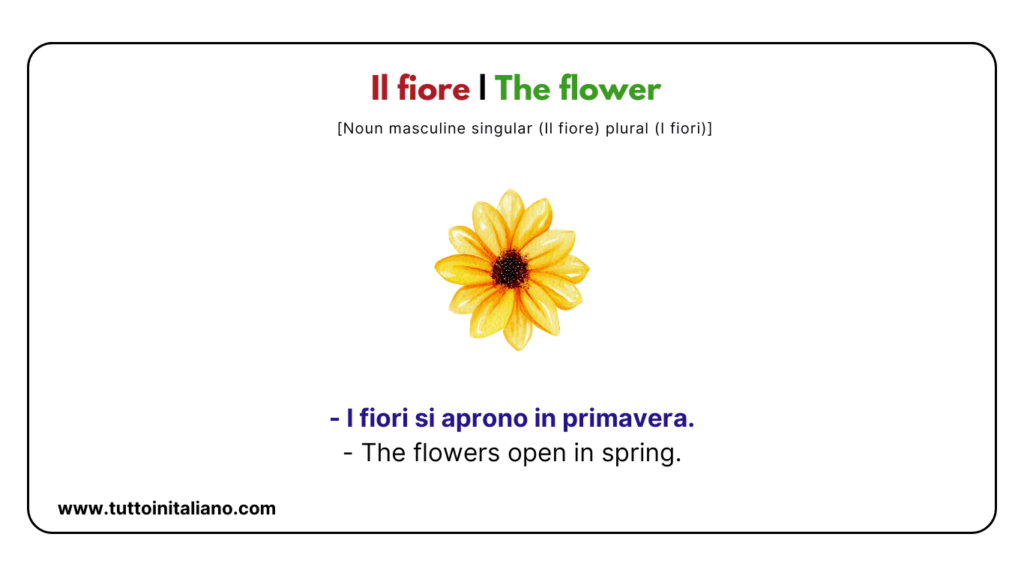
- Alessandro ha comprato un mazzo di fiori per la sua ragazza.
- Alessandro bought a bouquet of flowers for his girlfriend.
- Ci sono tanti fiori nel giardino.
- There are many flowers in the garden.
- Non raccogliere il fiore dal giardino.
- Do not pick the flower from the garden.
- I fiori si aprono in primavera.
- The flowers open in spring.
Amazon Ads
6. la pianta | the plant
Noun feminine singular (La pianta) plural (Le piante)

- Metto le piante sul balcone.
- I put plants in the balcony.
- Il giardiniere annaffia le piante al mattino.
- The gardener waters the plants in the morning.
7. l’Uccello | the bird
Noun masculine singular (L’uccello) plural (Gli uccelli)
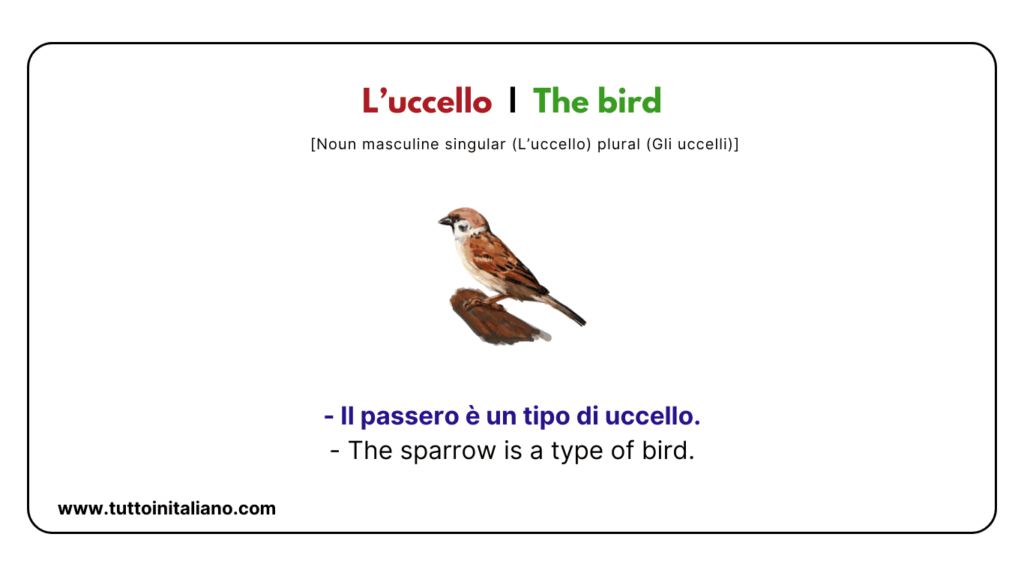
- Il passero è un tipo di uccello.
- The sparrow is a type of bird.
- Gli uccelli mangiano i semi.
- Birds eat the seeds.
- Gli uccelli vivono nel nido.
- The birds live in the nest.
8. il mare | the sea
Noun masculine singular (Il mare) plural (I mari)

- Elena e Milena sono andate al mare insieme.
- Elena and Milena went to the sea together.
- L’Italia è bagnata dal mare Mediterraneo.
- Italy is washed by the Mediterranean sea.
9. il fiume | the river
Noun masculine singular (Il fiume) plural (I fiumi)

- Il Po è il fiume più lungo d’italia.
- The Po is the longest river in Italy.
- Il Nilo è il fiume più lungo del mondo.
- The Nile is the longest river in the world.
- È difficile nuotare nei fiumi.
- It is difficult to swim in rivers.
- I coccodrilli vivono lungo il corso dei fiumi.
- Crocodiles live along the rivers.
10. il lago | the lake
Noun masculine singular (Il lago) plural (I laghi)
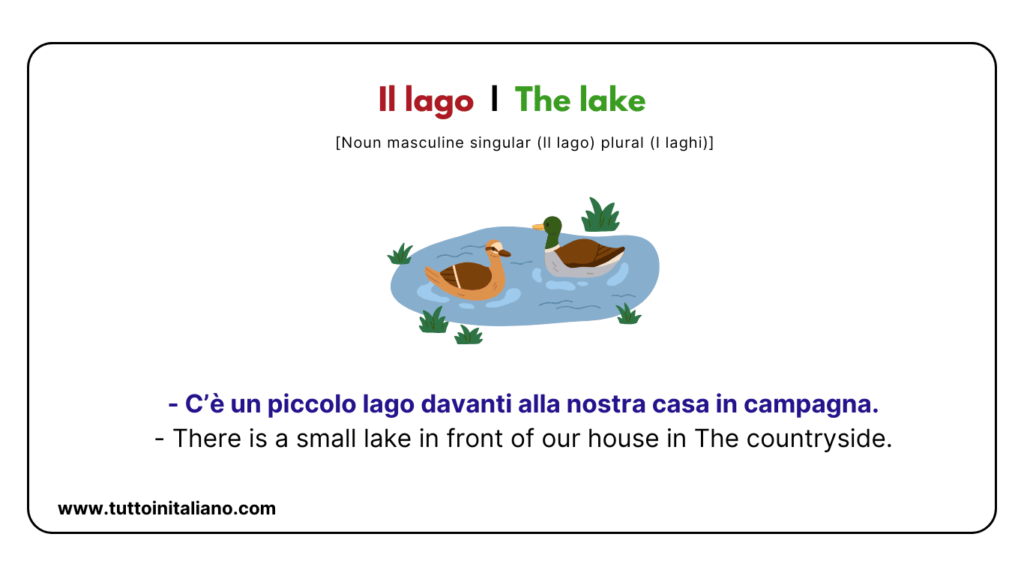
- C’è un piccolo lago davanti alla nostra casa in campagna.
- There is a small lake in front of our house in the countryside.
- Il lago è più piccolo del fiume.
- The lake is smaller than the river.
Amazon Ads
11. la montagna | the mountain
Noun feminine singular (La montagna) plural (Le montagne)

- In inverno, Angelo va in montagna a sciare.
- In winter, Angelo goes to the mountains to ski.
- Arrampicarsi significa superare ostacoli e difficoltà per raggiungere la cima di una montagna.
- Climbing means overcoming obstacles and difficulties to reach the top of a mountain.
12. la campagna | the countryside
Noun feminine singular (La campagna) plural (Le campagne)
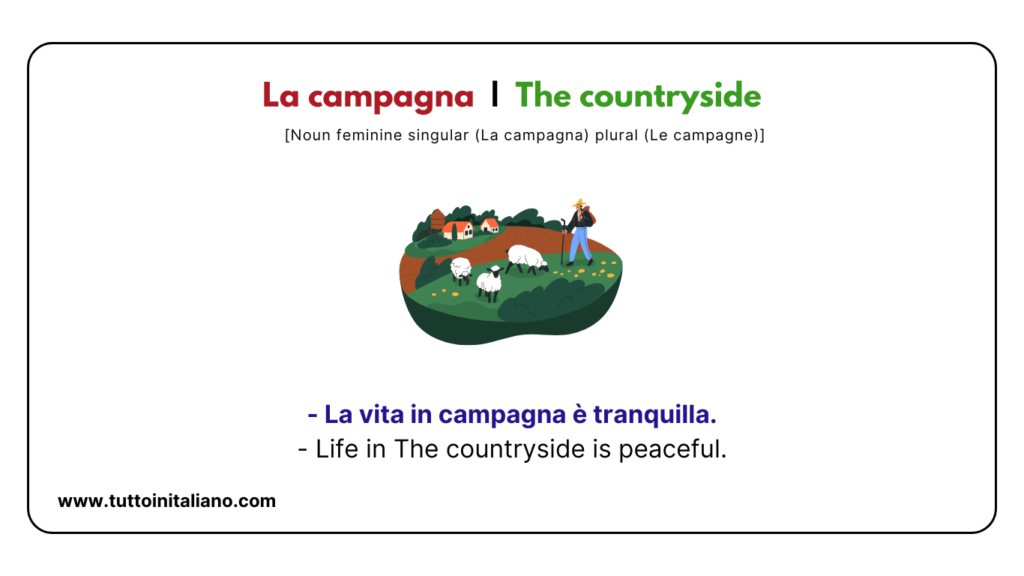
- Domani vado in campagna con la mia macchina.
- Tomorrow I am going to the countryside with my car.
- Il suo libro comincia con un racconto sulla vita in campagna.
- His book begins with a tale of country life.
- La vita in campagna è tranquilla
- Life in the countryside is peaceful
13. il cielo | the sky
Noun masculine singular (Il cielo) plural (I cieli)

- Il cielo è nuvoloso.
- The sky is cloudy.
- Il cielo è sereno.
- The sky is clear.
- Il cielo è azzurro.
- The sky is blue.
- Gli uccelli volano nel cielo.
- Birds fly in the sky.
14. il prato | the lawn
Noun masculine singular (Il prato) plural (I prati)
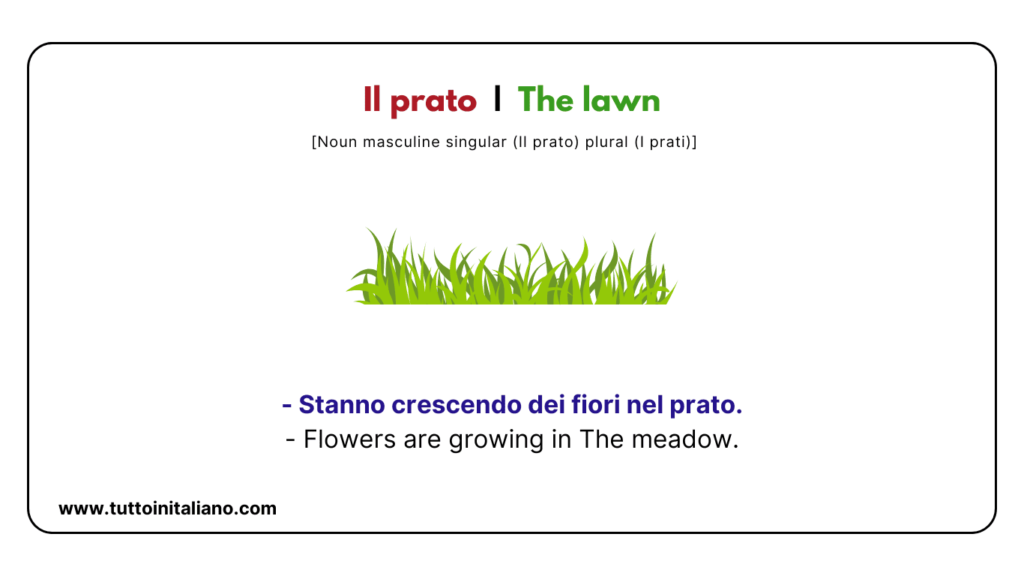
- I fiori stanno crescendo nel prato.
- Flowers are growing in the meadow.
- Il prato è ancora troppo bagnato per falciarlo.
- The lawn is still too wet to mow it.
- Nel giardino ci sono fiori e prati.
- In the garden, there are flowers and lawns.
15. il sole | the sun
Noun masculine singular (Il sole) plural (I soli)

- In estate mi abbronzo sotto il sole.
- In the summer I get a tan under the sun.
- Devo proteggere la mia pelle dal sole.
- I have to protect my skin from the sun.
- I gatti amano sedere al sole.
- Cats love to sit in the sun.
Amazon Ads
16. la stella | the star
Noun feminine singular (La stella) plural (Le stelle)

- Ho trovato una stella marina nel mare.
- I found a starfish in the sea.
- Ho visto una stella cadente nel cielo.
- I saw a shooting star in the sky.
- Ci sono tante stelle nel cielo.
- There are many stars in the sky.
17. il bosco / La Foresta / La Giungla | the woods/forest/jungle
Noun masculine singular (Il bosco) plural (I boschi)
Noun feminine singular (La foresta) / (La giungla) plural (Le foreste) / (Le giungle)
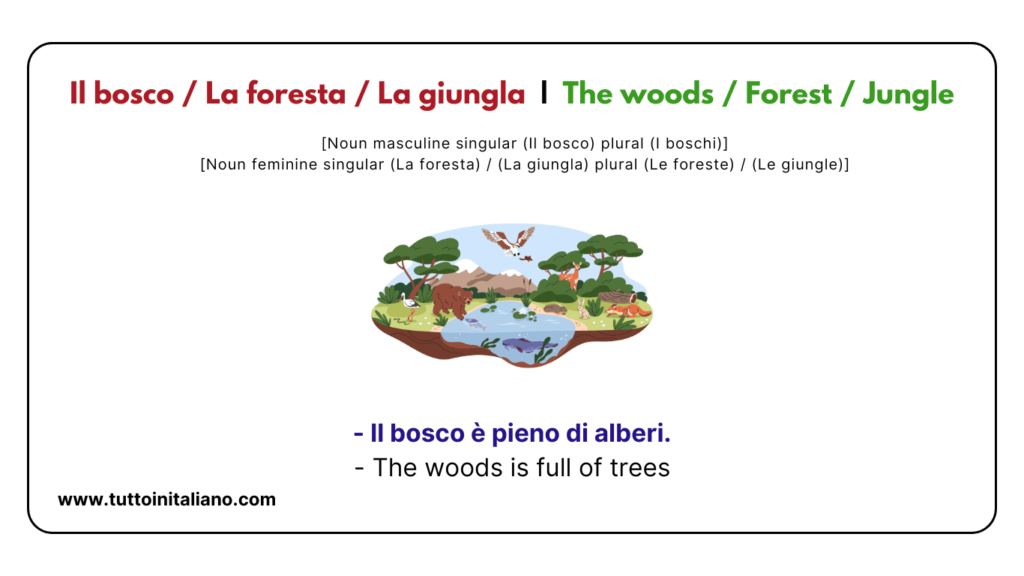
- Il bosco è pieno di alberi
- The woods is full of trees
- Gli animali vivono nella foresta
- Animals live in the forest
- Le tigri vivono nella giungla,e i leoni nella savana.
- Tigers live in the jungle, and lions in the savanna.
18. la collina | the hill
Noun feminine singular (La collina) plural (Le colline)

- La casa che sorge sulla collina è molto antica.
- The house that stands on the hill is very old.
- Il sole sorge dietro le colline.
- The sun rises behind the hills.
19. l’Isola | the island
Noun feminine singular (L’Isola) plural (Le isole)

- Capri e Sicilia sono isole italiane.
- Capri and Sicily are Italian islands.
- La Sicilia è l’isola più grande del mar Mediterraneo.
- Sicily is the largest island in the Mediterranean Sea.
20. il deserto | the desert
Noun masculine singular (Il deserto) plural (I deserti)
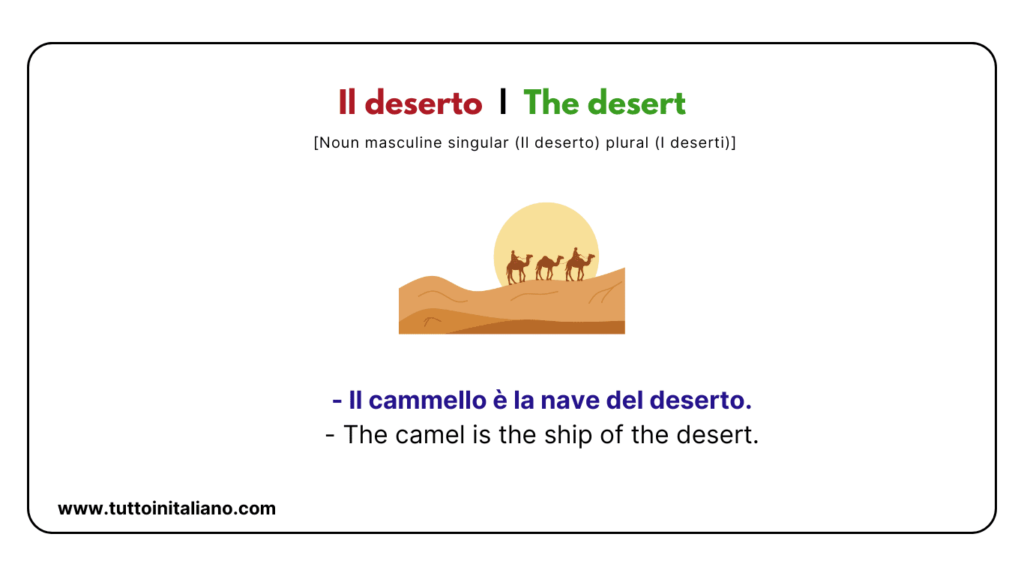
- Il cammello è la nave del deserto.
- The camel is the ship of the desert.
- I beduini vivono nel deserto.
- The Bedouins live in the desert.
- Il cactus è una pianta che cresce nel deserto.
- The cactus is a plant that grows in the desert.
Reading and listening
Ci vuole un fiore \ It takes a flower
Una canzone di Sergio Endrigo: Per fare un tavolo ci vuole il legno, per fare il legno ci vuole l’albero, per fare l’albero ci vuole il seme, per fare il seme ci vuole il frutto, per fare il frutto ci vuole un fiore, per fare un fiore ci vuole un ramo, per fare il ramo ci vuole l’albero, per fare l’albero ci vuole il bosco , per fare il bosco ci vuole il monte, per fare il monte ci vuole la terra, per fare la terra ci vuole un fiore, per fare tutto ci vuole un fiore
A song by Sergio Endrigo: To make a table you need wood, to make wood you need the tree, to make the tree you need the seed, to make the seed you need the fruit, to make the fruit you need a flower, to make a flower you need a branch, to make a branch you need a tree, to make a tree you need the forest, to make a forest you need a mountain, to make a mountain you need land. to make the earth it takes a flower, to make everything it takes a flower
Find the song on YouTube Here
Exercises on nature in Italian with answers.
Complete the sentences
- L’uccello vive sull’…
- I pesci vivono nel…
- Il contadino vive nella…
- Gli animali vivono nella..,…o nel..
- Sulla terra ci sono l’.., il…, la …
- Nel cielo ci sono il…e la ….
- Nel bosco ci sono …
- Il lago è più piccolo del…e il…
The answer
- albero
- fiume
- campagna
- foresta, giungla o nel bosco
- l’albero, il fiume, la pianta
- il sole e la stella
- gli alberi
- fiume e il mare


















